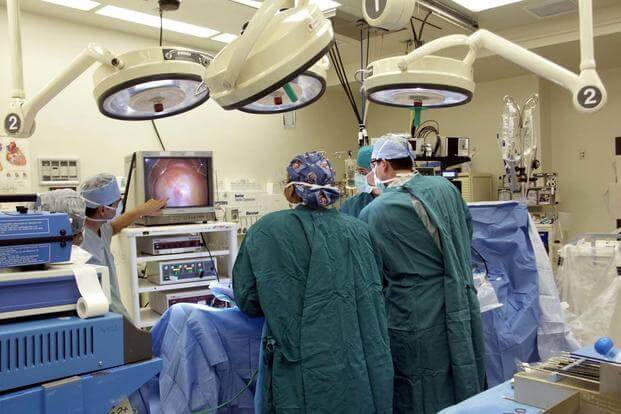The U.S. Air Force is notifying 135 patients who received colonoscopy or endoscopy procedures at Al Udeid Air Base in Qatar that they may have been exposed to blood-borne diseases such as HIV or hepatitis.
Air Force Medical Services announced Tuesday that scopes used for the upper and lower gastrointestinal procedures over an eight-year-period from April 2008 and April 2016 at the base clinic were not properly cleaned in accordance with Food and Drug Administration guidelines, Office of the Air Force Surgeon General spokeswoman Larine Barr told Military.com on Wednesday.
As a result, patients could have been exposed to possible viral infections that include human immunodeficiency virus, known as HIV, "and two kinds of Hepatitis (B & C)," Barr said. "The risk of infection is very small, particularly in a deployed environment, but we recommend that patients receive diagnostic testing," she said in an email.
The Air Force review determined that medical technicians used "an alternate method that included manual cleaning and inspection, rather than the recommended automated process," she said. "Specifically, it was noted that during equipment reprocessing, the flushing and brushing of the scope lumens were not completed as recommended by the manufacturer," she said.
The service reiterated that analysis by infectious disease experts shows the risk of contracting the diseases is very low, but still encourage additional testing.
"Providing quality health care to our Airmen and their families is our top priority," Brig. Gen. Robert Miller, Air Force Medical Operations Agency commander, said in the release. "We apologize to our patients and assure them that appropriate actions have been taken to address and mitigate the causes that led to this problem."
The Air Force said it has since taken preventative measures, including a "service-wide patient safety alert" for medical technicians to review and comply with proper endoscope cleaning, decontamination, inspection and sterilization processes.
In addition, military treatment facility commanders have also been directed "to complete the same review of all reusable medical instruments and devices" and experts are analyzing "best practices" procedures moving forward to prevent the same issue from occurring, the release said.
Officials noted that the Al Udeid clinic no longer performs endoscopy and colonoscopy procedures, and that all other procedures performed at the clinic were unaffected.
Miller said, "it's important for anyone who receives a notification to contact us to discuss the situation and if they desire to pursue diagnostic testing. Our medical team is here to address concerns and help patients throughout this entire process."
The Air Force said patients with questions or concerns may reach out to their healthcare resolution specialist at the following contacts: U.S. Eastern Daylight time zone or outside the continental U.S.: (937) 656-3818; U.S. Pacific or Mountain time zone, Hawaii, or Alaska: (707) 423-3443; and Central time zone: (228) 376-5603.
-- Oriana Pawlyk can be reached at oriana.pawlyk@military.com. Follow her on Twitter at @Oriana0214.




























